Interesting set of events here. A Naval Arms Race in the works? I think America, Japan, Italy and maybe even Germany should get in on that ...
The War that Had to Be Won (1936: The Road to War)
- Thread starter Kurt_Steiner
- Start date
-
We have updated our Community Code of Conduct. Please read through the new rules for the forum that are an integral part of Paradox Interactive’s User Agreement.
You are using an out of date browser. It may not display this or other websites correctly.
You should upgrade or use an alternative browser.
You should upgrade or use an alternative browser.
Chapter Six: A Spanish summer.
One of the enduring features of the Irish political maze was the ever lasting fight between the Fianna Fáil of Éamon de Valera and the Irish Parliamentary Party of W. T. Cosgrave. The IPP had barely survived John Redmond's death in March 1926 (1) but was under constant enemy fire from the Fianna Fáil, which accused them to keep Ireland under the British yoke. In the end this attritional warfare led to the split of the IPP into two nationalist parties: the Cumann na nGaedheal and the National League Party, which greatly contributed to de Valera's victory in the Irish general election of 1932. This defeat had caused the amalgamation of the two parties, which thus became the Fine Gael in 1933, and, led again by W. T. Cosgrave, managed to defeat de Valera in 1936, albeit by a very reduced margin. Damaged by the Anglo-Irish Trade War (1932-36) -2-, de Valera withdrew from goverment and waiting for another chance to return to power.
It is commonly said that had de Valera won in 1936 he would had abolished the Irish Free State, the title of Ireland as a Dominion of the Empire and announced the creation of the Republic of Ireland, thus severing almost all ties Ireland had to the British Crown. This possible chain of events has generated a common topic in the "What ifs" scenarios: London's reaction. Some people claim that No 10 would have send the Army to Ireland, while some other suggest that tehre would have been negotiations and a final agreement. After all, the main enemy was in the East, not in Ireland. We shall never know.
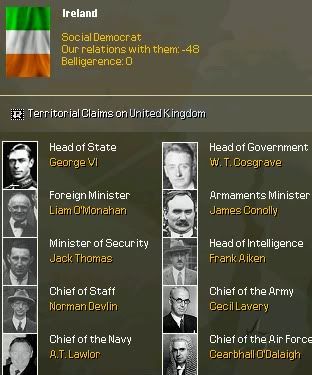
While this took place, the Foreign Office was prety busy in Scandinavia. Since the creation of the so-called "Iron Wall", Norway, Sweden and Finland had felt the dark shadow of Moscow growing wider over them and thus moved them closer to Britain and France. By June 1936 there were a series of around the clock meetings between lower and mid-level career diplomats from the Foreign Office and this three nations. The aim was to work out an alliance between the British Empire and the Scandinavian nations, an alliance which included full cooperation between the military high commands of all four nations, annual field exercises and the exchange of material technologies as well as full cooperation in times of war and peace. However, in the end those meetings proved fruitless as Sweden was reluctant to abandon her neutral policy and Norway just vaguely agreed to some kind of military collaboration. Only Finland openly expressed her interest of signing that kind of alliance. In the end, nothing fruitfull came out of it.
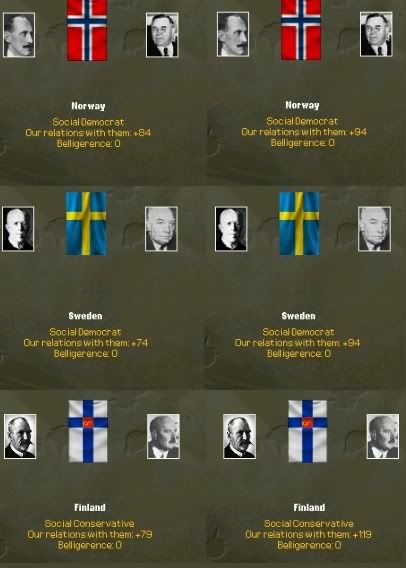
After six months of negotiations, Scandinavia didn't seem to be closer to London, in spite of the threat of Red Bear
Then, in July, worrying news came from Spain.
Rumours of a military coup were, of course, widespread, and a few of them were actually accurate. Some voices claimed that General Mola had started contacts with Carlist leaders for their collaboration in an eventual uprising. There was a problem, in fact: in exchange for their support, the Carlist demanded to have the monarchy back. And for the Carlist and their leader, Fal Conde, that meant a catholic reactionary monarchy. Mola wasn't too keen on that, and thus the meetings went and went on until the military intelligence was aware that some generals were preparing an uprising. The interception of a letter between Mola and Fal Conde on June 16th gave more substance to rumours.
Then came the obscure and failed murder attempt against the monarchist leader José Calvo Sotelo. For a few days it seemed as if the Spanish gunpowder was to erupt. And then, in the morning of July 16th, up to 15 generals and dozens of other officers were arrested in their headquarters all over Spain by the Guardia de Asalto. Between them were generals Mola, Queipo de Llano, González Carrasco, Goded and Cabanellas, and other members of the clique. Some tried to oppose resistance and there were armed incidents in Pamplona, Mallorca, Ceuta, Tetuán and Melilla, but by the afternoon of the 16th of July, the conspiracy was over. Then the Great Purge of the armed forces started. By the end of that year, 3,500 officers of the Spanish Armed forces were removed although 10-20% of those officers were allowed to come back in 1939-1940.
A coup d'etat and perhaps a civil war had been just avoided.
(1) I needed him for a little longer.
(2) This time the war was shorter and worse for de Valera than for his rivals. Also the Labour Party did not support tacitly de Valera, helping in his fall from power.
[GAME NOTES: I twisted a bit the savegame to have the "right" (for me) government here -I can't stand de Valera, blame Draco Rexus for that- and to keep Ireland friendly and stop buggering about "we want the Ulster back- all time; I tried to improve the relations with the Scandinavia nations -leaving Germany to attrack Denmark- and, well, it didn't work too well -waste of money-. And finally I did some tricks to avoid the old and traditional SCW. Does that mean that Spain is t enjoy a time of peace and calm? Nope. She has still to endure her politicians, I'm afraid]
@trekaddict: No, it was a worlwide event but its deepest effects were over the USA economy.
@El Pip;: Yes, there are two SHBBs (unnamed yet) in the making. Let's hope that they're finished before the war ends.
Hey, the Tak men wanted to have something different this time.
@Nathan Madien: Al Smith got elected in 1928, had a chance to "enjoy" the crash and then got kicked out of the White House by Hoover in 1932, who didn't fare better...
@TemplarComander: JApan is going to give me hard times, I know. Italy... well, if her industry manages to do something proper I'll be mightly surprised. About Germany... I'm planning the old scheme: Royal Navy at sea, panzers in the continent but with a twist.
Last edited:
Idea! Communist Coup and a three point five way civil war, Communists v. Anarchists V. Carlists and Basques!
Aww...Kurt took away the Spanish Civil War. Now we can't place bets on how long it will take for one Spanish AI to defeat the other. 
Connoly, the aegis of internationalist revolutionary socialism in a cabinet under the leadership of George V? But then again, nice to see the Assault Guards finally showing some balls and save the world from the horrors of Francoism and reaction. Jesus, what a trade off, Kurt. 
That Irish Chief of Staff, he doesn't have a son named Liam who is friends with a certain German Para?
Chapter Seven: Et in Africa Ego...
Had been not for its gruesome body count, the Second Italo-Abyssinian War would have been awared the prize of being the "silliest war of the 20th Century". It began in October 1935 and, from its very beginning, it looked as if the Regio Esercito (the Italian Royal Army) had won the war even before it had started. Even those who had witnessed the disaster of Caporetto were sure that the war was to be short and to end in an Italian victory. Indeed: their forces were massive, well-equipped and with high spirits. However, they lacked an essential element: good commanders.
On March 28, 1935, General Emilio De Bono was named as the Commander-in-Chief of all Italian armed forces in East Africa. His subordinate was General Rodolfo Graziani, the Commander-in-Chief of forces invading from Italian Somaliland, the "southern front". De Bono began the invasion with a surprise attack without a declaration of war. Spearheaded by armored forces and covered by the Regia Aerounautica (the Air Force), the Italian army advanced slowy, too slowly. It is often claimed that De Bono had two things in his mind: the disaster of Adowa (1896) and the vision of the Ethopian army charging in masse against his guns and machine guns in an Italian rendition of Rorke's Drift (1). Whatever he had in mind, he was rudely disappointed as the Ethiopians were not too keen on being slaughtered. Until November 8th the Italian forces did not captured Makale. That was enough for Mussolinni, who sacked De Bono and replaced him with Pietro Badoglio.
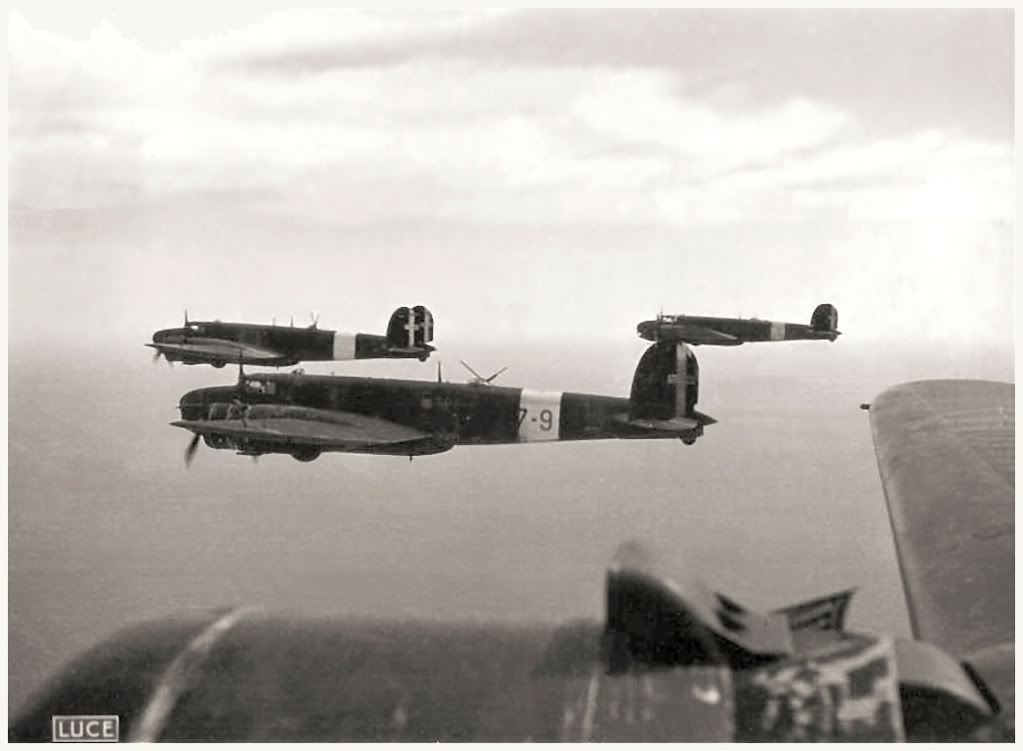
The Fiat BR.20 bomber provided the backbone of the Regia Aeronautica during the Abyssinian war (2).
As this command shakeup took place, the Ethiopians began a major offensive, the so-called Christmas Offensive, sent an overwhelming 190,000 Ethiopian infantrymen with the few tanks and airplanes that Haile Selassie could gather for the attack. Amazingly, it was a success which stalled the Italian advance. Rough terrain immobilized the Italian tanks and the charging Ethiopian infantry just slaughtered the unlucky Italian columns that they found on their path. Thus began the so-called “Black Period” of the war. It was then when France decided to intervene on the issue.
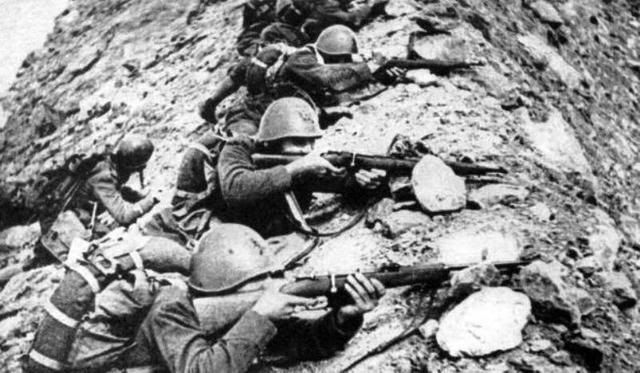
Italians soldiers fighting amidst boulders in a forgotten Ethiopian corner that now it's forever Italy. In spite of the poor show fo their generals, the foot soldiers of the new Impero Romano provided an outstanding example of courage under enemy fire
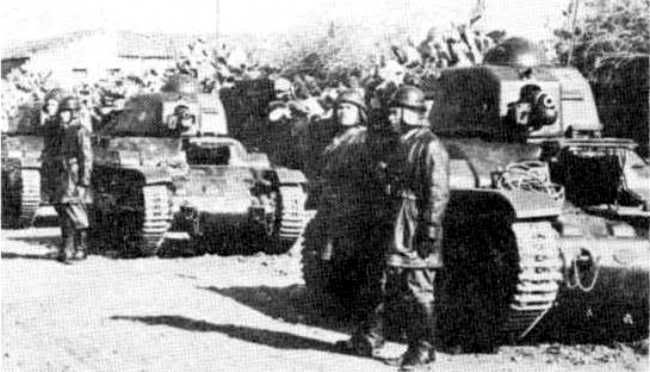
France's answer to Italy's troubles: R35 tanks.
[GAME NOTE: Silly me, I was so amused when the "Italy has annexed Ethiopia" in bloody August 1936 that I forgot to take a screenie of that.]
(1) Of course, he forgot that to have Rorke's Drift he would need to have first an Isandlwana.
(2) To compensate for its utter lack of military capabilities, the Italian IA has rushed a bit the entry of the BR.20.
(3) Never told you how much I love French sense of humour? Of course not. I'm not a bloody liar.
(4) Silliest perfomance of the Italian IA ever seen by this your trully.
@Sumeragi: I hope so!
@Viden: Did I ever told how much I like that proves of good taste? I do, indeed.
@H.Appleby: I'm tempted to do something about a Communist Coup in Spain and then have a civil war between Communist vs Socialists vs Annarchists vs Rightwinged vs Basques vs Catalans vs Atheists vs Religious people vs those who like saussages vs those who prefer paella but something told me that it would be a tad too much.
@Nathan Madien: Had I knew it about the Abyssinian sidesgow, we could have placed bets on that. Well, we will have China for that, don't worry.
@Milites: I've was busy enough trying to find a suitable leader that somewhere I had to make a mistake... And the Assault Guards, from time to time, had a lot of balls, trust me.
@trekaddict: I have not the slightest idea. And trust me, I've tried to find some info about that chap. But nothing came out of it.
Last edited:
@H.Appleby: I'm tempted to do something about a Communist Coup in Spain and then have a civil war between Communist vs Socialists vs Annarchists vs Rightwinged vs Basques vs Catalans vs Atheists vs Religious people vs those who like saussages vs those who prefer paella but something told me that it would be a tad too much.
What? You forgot the vengeful spirits of the Hapsburg Kings of Spain, the Galicians, the Molemen, the Hobos, Napoleon Bonaparte and his legion of undead Frenchmen, the Luxembourgish Panzer Corps and the marauding brigades of authors terrorizing the countryside with depressing novels!
Perhaps LaRoque will engage in his own Peninsular Campaign to free his fascist brothers?
Last edited:
De La Roque really has a rather funny concept of statesmanship; I wonder how he'll feel when Mussolini's incompetence comes up; hopefully at the worst possible moment of the war.
A bit sad about Ethiopia though, as they're destined to be the first victim in every WWII based AAR; a bit like Kenny, when you think about it
A bit sad about Ethiopia though, as they're destined to be the first victim in every WWII based AAR; a bit like Kenny, when you think about it
Six months later Badoglio had advanced slowy, too, defeating the Ethiopian army in three battles (1st and 2nd Tembien, Genale Doria and Amba Aradam). Finally, in August 1936 (4) Badoglio launched the “March of the Iron Will” which led to the capture of Addis Ababa and the effective end of major land operations.
I love the grand-sounding name "March of the Iron Will". It just reeks of irony.
Chapter eight: The Duce is Dead, Long Life the Duce!
The annexation of Austria by Germany had an unexpected consequence: the reapprochement of France and Italy. De la Rocque was quite angered by Laval's failure to persuade Mussolini to stand firm in front of Germany's "bluff", and thus the Minister of Foreign Affairs saw himself replaced by Paul Reynaud (1). Reynaud had followed a long path from his early days with the Alliance républicaine démocratique (ARD, Democratic Republican Alliance) and switched sides after the crisis of 1934. Now, the new Minister flew to Rome to make a deal with il Duce. Unexpectedly, he was to become wittness of a tragic event: the assassination of Benito Mussolini.
Apparently, all the process that led to the death of il Duce began in 1936, when a Briton called Alexander Foote deserted the RAF to go to Spain, where, according to some people, a revolution was to take place. Thus he came, he saw and he got depressed by the lack of "revolutionary spirit". There he was offered by a Red Army agent a chance at "secret and dangerous" work and Foote accepted without having the slightest idea of what he was going to do. In Geneva he met his spymaster, Ursula Hamburger, "Sonia", a Communist German exile who sent him to Milan to learn about the enemy and pick up some Italian, hoping that another foolish Briton going on "tour" wouldn't be noticed by Mussolini's secret police, the "OVRA (Organizzazione per la Vigilanza e la Repressione dell'Antifascismo, Organization for Vigilance and Repression of Anti-Fascism"). Suddenly a chance to assassinate il Duce appeared. Sonia sent Foote a collaborator, Leon Beurton to help him in the mission.
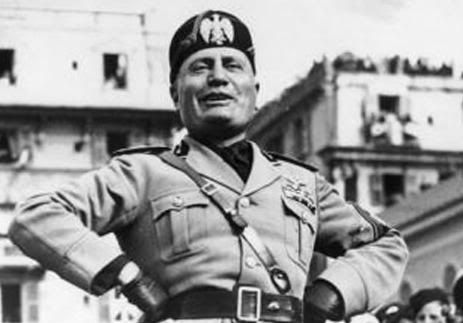
Benitto Mussolini (1883-1936)
The chance came from Lybia. There Italo Balbo, governor of Libya, had set out himself into an Herculean effort: to turn the coast of Lybia in the "Fourth Shore", the southern part of "Greater Italy". To achieve this he began by building the Via Balbia, an highway intended to create a land route between Tripoli and Benghazi, and by colonizing Libya with Italian settlers. Balbo’s dream was to turn Libya again in the breadbasket it was in Roman times and to achieve that he decided to do it with instituted massive irrigation and ecological reclamation efforts and a flood of Italian settlers. Early attempts at colonization had been mostly private ventures and largely unsuccessful but Balbo was determined to bring permanent settlers by the hundreds of thousands. With the help of hired geologists, mining experts, and various explorers, Balbo began a vast building program of schools, utilities, transportation, houses and entertainment. By October 1936 the influx of settlers was so great that Balbo leased two ocean liners at government expense to bring them to Libya. The departure of one of those liners, the Antonia Graza, (2) from Naples (7 December 1936), which was to become a big Fascist event presided by il Duce himself, became thus the chance for Foote and Beurton to strike hard.
Thus Foote saw himself carrying a bomb hidden in a small envelope that Beurton had carrefully prepared with the help of a still-today-unknown exile, who claimed to be an "expert" in explosives. Alàs, that Third Man was not so expert as he claimed, as Foote discovered too late. The Briton managed to evade the attention of the OVRA by pretending to be a member of Mosley's BUF arrived to Italy to "learn" about the wonders of the "great Italy" that il Duce was building. He even had some faked introductory letters from several Fascist leaders to prove that. Thus, on the crucial day he managed to mingle among the crowd and move quite close to where the Issota-Fraschini limo bearing the Duce’s standard stopped. As the limo doors opened and Ciano stepped out, Foote began to manipulate the bomb. Then something misfired. Literally.
As il Duce himself exited the car in almost regal attire, the crowd pressed forward to see him. Foote found himself lost in a human wave before the Carabinieri managed to bring some order. However, the rush had send poor Foote close to il Duce. In fact, too close to comfort as he stood looking eye to eye to the not quite bemused Fascist leader. Foote then remebered that he had triggered the bomb and thought hurriedly what to do next abut before he could do anything or Ciano could bark some order to the Blackshirts, his father in law and Foote discovered that Beurton had made a small mistake: the fuse was shorter than expected and ten seconds after Foote had activated it, the bomb came to life and an explosion rocked Naples harbour.
Thus Alexander Foot vanished in a blaze of glory, along with Mussolini and Ciano, whose churned remains had to be removed from a lamp post..
Confussion and chaos spread all around. Victor Emmanuel III declared martial law himself and activated the army to assist the carabineri in maintaining public order. He then phoned Balbo to tell him about the murder and to warn him about rumors of plot within the party. Meanwhile, in spite of the efforts of the army and the Carabinieri, pro-fascists and anti-fascists clashed on the streets, leaving twenty five dead on the streets in the hours that followed the magnicide. In the halls of the Chamber of Deputies things were getting truly heated. Accusations, finger-pointing, and blatant power grabs started at once while the factions and divisions long exploited by Mussolini in order to maintain control over the party now turned on one another.
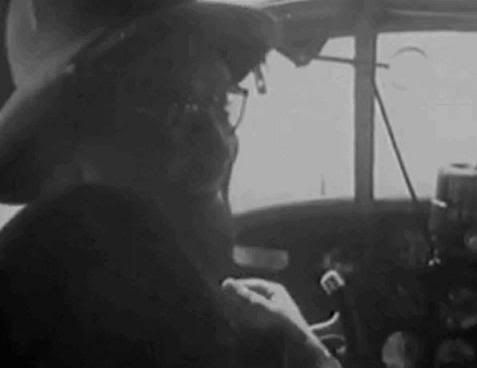
Italo Balbo piloting the I-MANU on the way to Rome.
Then Balbo arrived to Rome. At 9 o'clock in the morning (8 December 1936), the I-MANU, Balbo's personal SM.79, together with four more bombers and loaded up with supplies, luggage, his family and his advisers, made a fly-by over the city, still covered by the ashes and smoke of the fires caused by the riots and partisan clashes. The weary citizens of Rome looked up at the spectacle. Most were still shocked, but here and there a wave or even a cheer erupted. Then the radio announced that Marshal Balbo was going to land at the airport. A spontaneous crowd of people began moving towards the airport to greet him.
As he exited the plane he was received with shouts of "Viva l'Italia!", "Viva Balbo!", and even (to the Gerarchi's consternation -3-) "Duce! Duce!". The Flight to Rome, as it became known, was a crucial moment in Balbo's career. In typically Balbian fashion he had arrived to Rome at a time when no other major player had so much as appeared on a high balcony, but he had also met and embraced the people of Rome at their darkest hour. In a "stunning display of bravery and leadership" or a "shameless self-promotion stunt", Balbo had placed himself in the center of Italy's attention.
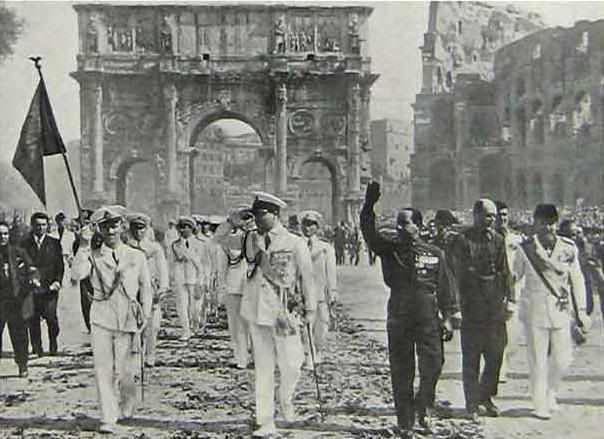
Balbo in Rome: the beginning of his bid for power.
(1) Laval makes me uneasy so I picked a solution offered by Atlantic Friend's Crossfires, a French AAR for HoI2 Doomsday
(2) This is a revenge for the film "Ghostship", it goes without saying.
(3) Gerarchi: the big bosses of the Fascist party.
@H.Appleby. And the hordes shouting "We want Gilbraltar back". No, let's keep it nice and quiet...
Perhaps... However, to do that would be to repeat Napoleon's mistake. Do you think he's read enough history to do that?
@Mr. Santiago: Indeed. Alàs, we shall never know...
Ethiopia, Spain and China are the Kenny's of the AARland.
@Nathan Madien: I must agree. The typical Fascist grandeur is sometimes too amusing.
Last edited:
By making Balbo the leader, perhaps he will live longer now.*
*Which would be a rarity, given Kurt's finely-tuned killing ability
*Which would be a rarity, given Kurt's finely-tuned killing ability
*Which would be a rarity, given Kurt's finely-tuned killing ability
Actually, I think Kurt's turned killing historical characters into some strange form of art
*Rolls on the floor*
How Kurt makes such heavy material into the blackest comedy.....
How Kurt makes such heavy material into the blackest comedy.....
Typically, Benito has to walk all the way to Rome whilst Balbo just flies  I see great things for the would be Duce - if he manages to stay away from airplanes flying above the Mediterranean - which I suppose is kinda hard for an air marshal.
I see great things for the would be Duce - if he manages to stay away from airplanes flying above the Mediterranean - which I suppose is kinda hard for an air marshal.
Chapter nine: Purged Peace
By early 1937, calm was returning to Europe. In Spain most of the political violence that had put the Republic at the stake had disappeared as if the failed coup d'etat had acted as a catharsis for the Spanish public. Politically, though, the chaos was even worse. While the moderate wing of the Partido Socialista Obrero Español (PSOE - the Spanish Socialist Workers' Party) had triumphed over this rivals, the right parties were equally divided, with Falange and the Carlist party having been illegalized for the role played in the failled coup and half of the Confederatión Española de Derechas Autónomas (CEDA - Spanish Confederation of the Autonomous Right) against the llegalist stance of its leader, Gil Robles. It was then when Azaña thought that Spain was ripe for a change: Legislative elections were called for March 1937.
As expected, the Popular Front (winning 287 seats from a total of 480 and winning 24 seats) carried the day while the right lost ground (going down from 156 to 134). The surprise was the rise of the anarchist party. In a solution that could work only in Spain, the more moderate members of the anarchist movement created the Partido de los Trabajadores Españoles (PTE, Party of the Spanish Workers) on January 1st, 1937. The idea of an anarchist party working and collaborating with the bourgeois institutions was too much of a stretch for most sympathizers, but, oddily enough, it worked: with 45 seats, the PTE became the 3rd largest force in the Popular Front; but Azaña, fearing France and Britain's rebuke, only gave the anarchists two seats at the new government: Federica Montseny would become Minister of Health, and the first woman to ever hold such an office in Spanish history, and Juan García Oliver, the new Interior Minister.
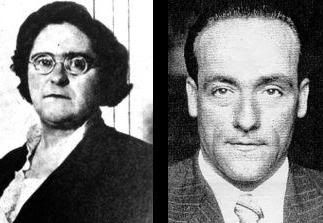
The Anarchist paradox made flesh: Montseny and García Oliver, Libertarian ministers.
In Italy the political chaos that followed the assassination of Mussolinni still raged on. Several weeks went on and the fascist government had still to agree upon even a structure for the post-Mussolinian government, none the less a head. With the king staying out of the debate and the army, led by Marshal Badoglio, adopting a passive attitude there was no danger for the Fascist Party to be removed from power. Soon a faction vanished from the battle for power, the one led by Achille Starace, doomed by, his radical and racist attitudes. When some of his provincial Ras threated with a "second march" on Rome and Marshal Badoglio abandoned his silence to point out that the army wouldn't stand down this time, Starace's time in politics came to an end. The next faction to vanish was the Nationalists of Luigi Federzoni, a small but potent group divided in its support to the monarchy and the party (depending on the issue). As the king remained silent, Federzoni did so, ready to become a swing-faction in the continuing power struggles of the Fascist Interregnum.
Still remained the Corporative faction, made up predominantly of the old syndicalists, a disorganized but influential group with a lot of influence among the party left. and the Confindustria faction, an alliance of industrial, financial, and land-owning elites with strong influence into the aristocracy, army and the bourgeoisie. Apparently, this two groups were to decide the outcome of the Iterregnum. Two names emerged as potential leaders: Dino Grandi and Italo Balbo. At first Grandi, whom the king was rumored to favor, appeared as a viable compromise candidate, but Balbo quickly reestablished his old ties with the Confindustria and the armed forces. This, along with his reemergence as the central figure of the Roman social scene (taking Ciano's place) won him access to the aristocracy and the monarchy. Only the reticence of Badoglio and the scale of the internal opposition within the party kept Balbo from an early assumption of high office. Eventually, the deputies, pressed to choose for a name before the nation tore itself apart and fell into violent anarchy, selected Balbo for Mussolini's vacant Capo de Governa (Chief of the Government) position.
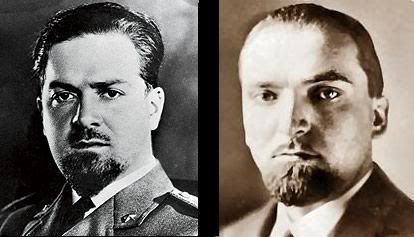
The two rivals: Italo Balbo and Dino Grandi. In the end, there could be only one.
In the USSR Stalin had undertaken a deep reorganization of the regime and to achieve that he "purged" the Communist Party and the Army (october 1936-october 1939). Several prominent party leaders as Zinoviev and Kamenev and lesser figuras as Radek, Piatakov and Sokolnikov were accused of conspiring with fascist and capitalist powers to assassinate Stalin and other Soviet leaders and restore capitalism. The bulk of the defendants were judged in the so called Moscow Trials and eventually shot while the rest received sentences in labor camps. Few survived the ordeal. Even Leon Trostky, who was in exile in Mexico, was assassinated by a Soviet agent.
However, the worst was to come. Even the army was purged. Apparently, several high ranking officers had began to conspire against Stalin when the purge of the Party had began. Marshal Tukhachevsky and generals Yakir, Uborevich, Eideman, Kork, Putna, Primakov and Gamarnik were accused of anti-Soviet conspiracy and sentenced to death. This trials just triggered a massive purge of the Red Army. When it ended by late 1938 The purge of the army removed three marshals, 13 army commanders, eight admirals, 57 army corps commanders, 110 division commanders, 16 army commissars, and 25 army corps commissars had been arrested, executed or dissmissed from the army. On the intelligence side, things were just as grim. When Lavrenti Beria replaced Nikolai Yezhov as head of the NKVD by late 1938, the NKVD and the GRU were purged too. The killing machine reached even those spies working abroad with the Fourth Department. Stalin's logic was quite simple: those who had contact with foreigners were suspect, especially those working abroad and with contacts with foreign sources. They had to be executed. Their controllers in Moscow too. After all, they had been associates of enemies of the people.
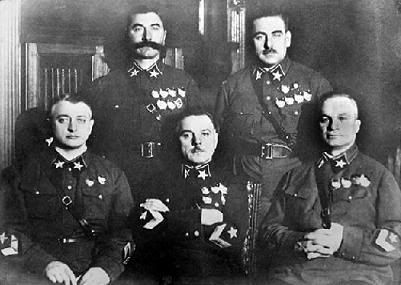
The five Marshals of the Soviet Union in November, 1935. (left to right): Mikhail Tukhachevsky, Semyon Budyonny, Kliment Voroshilov, Vasily Blyukher, Aleksandr Yegorov. Only Voroshilov and Budyonny survived the Great Purge.
It is unknown if Stalin would have curbed his terror had not been for the rearmament programs of Italy, France and Germany and Japan's expansionism in China.
@Viden: Well spotted! For this action I shall name thee PetiKnight of the PetiOrder of Hoy Pizza of Antioch. Don't take out the salami. Ever. And don't, I repeat, don't count to three. Never.
@Nathan Madien: That's the idea, even if keeping people alive looks a bit odd in one of my AARs...
* I did keep alive Raymond Asquith, Wilfried Owen and Manfred von Richthofen, for instance.
@Mr. Santiago: Thank you!
@Sumeragi: I can't help. Life is too serious to be taken seriously, you know.
@Milites: I must admit that I'm quite intrigued by Balbo's figure and I have big plans for him and for Italy. He'll keep flying and I'll keep away from his own AA guns. Just in case...
Last edited:

